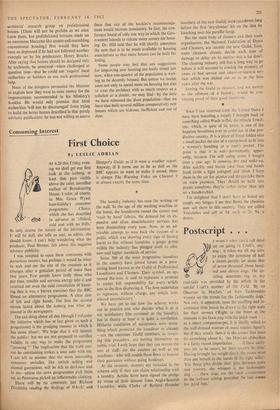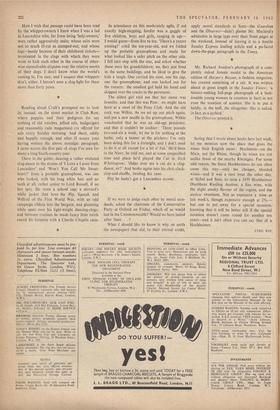Postscript • • •
ev, set on going to Croft's, any- . way : it takes me all my time a dozen people. let alone that of seven thousand. three hund- red and clesen dogs. The de- to enjoy the company of half WASN. I 11 hat you'd call dead ciding deterrent •• tug to My coat-tails was provided by the article in the special Cruft's number of the Ficfd, 'By an Observer in Mayfair,' on how 'fashionable women set the trends for the fashionable dogs.' Not only, it appeared, must the snuffling and in- continent little beasts be drawn to the right scale for their owners ('Right to the front at the moment is the fawn pug with the black mask . . as a smart companion-pet, it is ideally suited to the'well-dressed woman of more, mature figure'), but if they aren't. then it is the owner that must do something about it: 'the Nlexiean chilwahua is a fairly recent importation . . if these carry- pets are to be smart, let their owners he slim.' Having brought her weight down, the owner must then put herself in the hands of the right tailor : 'For those who divide their time between town and country, the whippet is the fashionable dog . . . these dogs are the ideal complement to the well-cut suiting, provided the lady-owner hay good legs.' . How I wish that passage could have been read by the whippet-owners I knew when I was a lad in Lancashire who, far from being lady-owners,' were rather aggressively male; whose suits were not so much ill-cut as stamped-out; and whose legs—bandy because of their childhood rickets— terminated in the clogs with which they were wont to kick each other in the course of other- wise unresolvable disputes over the relative merits of their dogs. I don't know what the world's coming to, I'm sure, and I suspect that whippets don't, either. I haven't seen a clog-fight for these more than forty years.
Reading about Cruft's prompted me to look in, instead, on the street market in Club Row, where puppies and their pedigrees (to say nothing of old watches, jellied eels, budgerigars and reasonably rude magazines) ire offered for sale every Sunday morning. And there, oddly and happily enough, and after (1 assure you) having written the above nostalgic paragraph, 1 came across the first pair of clogs I've seen for many a long South-country year.
There in the gutter, dancing a rather etiolated clog-dance to the strains of 'I Love a Lassie from Lancashire' and 'Won't You Call Me Sweet- heart?' from a portable gramophone, was one who looked, with his long white hair and no teeth at all, rather senior to Lord Russell, if no less., spry. He wore a school cap; a steward's white jacket that bore the Pip, Squeak and Wilfred of the First World War, with an odd campaign ribbon into the bargain; and gleaming white spats over his light-weight dancing-clogs; and between routines he made fancy little twirls round his forearm with a Charlie Chaplin cane.
*
In attendance on this moderately agile, if not exactly high-stepping, hoofer was a gaggle of five children, boys and girls, ranging in age— I would guess—from five to ten. 'There's a rozzer coming!' cried the ten-year-old, and we folded up the portable gramophone and made for what looked like a safer pitch on the other side. I fell into step with the star, and asked whether these were his grandchildren; no, they just lived in the same buildings, and he liked to give the kids a laugh. One carried his cane, one his cap, one the gramophone, and one looked out for the rozzers : the smallest girl held his hand and skipped over the cracks in the pavement.
The eldest girl told me that her name was Jennifer, and that this was Pam : we might have been at a meet of the Pony Club. And the old cock was Wilkie. As we set up our pitch again, and put a new needle in the gramophone, Wilkie vouchsafed that he was an old-age pensioner, and that it couldn't be cushier : 'Three pounds two-and-six a week; let me in for nothing at the baths; only a tanner at the pitchers; I've only been doing this for a fortnight, and I don't need to do it at all except for a bit o' fun.' He'd been in the Navy, he told me, and at some unspecified time and place he'd played the Cat in Dick Whittington: `didjer ever see a cat do a clog- dance, sir?' And broke again into his click-clack- clop-and-shuffle, twirling his cane.
Pity he hadn't got a Lancashire accent.
if we were to judge each other by moral stan- dards, asked the chairman of the Conservative Party at Oxford 'on Friday, which of us would last in the Commonwealth? Would we have lasted after Suez. . . ?
What I should like to know is why on earth the newspapers that did, to their eternal credit, apply moral standards at Suez—the Guardian and the Observer—didn't plaster Mr. Macleod's admission in large type over their front pages at the weekend, instead of leaving it to a hostile Sunday Express leading article and a po-faced down-the-page paragraph in the Times.
*
Mr. Richard Avedon's photograph of a com- pletely naked female model in the American edition of Harper's Bazaar, a fashion magazine. has created something of a stir. It was written about at great length in the Sunday Times: 'a history-making full-page photograph of a fash- ionable young woman (a countess in fact) in not even the scantiest of scanties. She is to put it baldly, in the buff, the altogether. She is naked, in fact, as a jaybird.'
The Observer printed it.
*
Seeing that I wrote about hocks here last week, let me mention now the place that gives the wines their English name : Hochheim—on the Main, not the Rhine, though its wines are not unlike those of the nearby Rheingau. For some odd reason, the finest Hochhcimers do not often come this way—only the cheaper, blended wines—and it was a rare treat the other day, at Sichel and Sons, to taste a 1959 Hochheimer Daubhaus Riesling Auslese, a fine wine, with the slight smoky flavour of the region, and the auslese sweetness. Not as expensive a wine as last week's, though expensive enough at 25s.— but one to put away for a special occasion, knowing that it will be better still if the special occasion doesn't come round for another ten years--and it isn't often you can say that of a Hochheimer.
CYRIL RAY


































 Previous page
Previous page